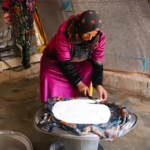The suffering of displaced Syrians in the camps of northwestern Syria increases year after year, and with their long wait for a solution that will end their tragedy and return them to their homes in their cities and villages, it was necessary to find solutions to improve their bitter reality, especially after the scarcity of humanitarian aid in recent years.
Jamal, who is 37 years old and suffers from blindness, did not realize at first glance the horror of what had happened. His house in Maarat al-Numan was bombed, and he quickly left with his family. He did not know where the destination was and did not have any means of transportation that would take them out of danger. He did not realize that this would be his last moment in his city.


Jamal headed with his family and five children to the city of Saraqib, but the bombing quickly followed them, so they moved to a second and third place…, each time their situation became more difficult, their suffering increased, and they lost part of what they had left, until they ended up in the Salwa camp in the Idlib countryside.
He was a guest with his relatives, and then he moved to a tent provided for him by charitable people as a shelter for him and his family, but it was not appropriate for his situation, especially since he has special needs and is blind, so he cannot lean against a wall and feel places while he walks in and out.
Jamal lived through bitter days. The camp was random in a rugged terrain, with no roads or any infrastructure to relieve him of what he was in. When he needed anything, he had to walk long distances on the muddy and rugged roads in winter to meet his own needs, which was the reason for his eldest son’s lack of commitment to school and education, Jamal needs someone to hold his hand and lead him to the place he wants
All this did not cause Jamal to lose patience, and the hope of returning to his country was always present in his mind, to rebuild what the bombing had destroyed and continue his life with his family. His living conditions soon began to improve, after the Ataa Association completed several service projects in the camp, the most important of which were paving the roads, lighting the streets, and constructing blocks. Health.
Jamal says: I have become dependent on myself to meet my needs and I no longer suffer from the difficulty of navigating the rugged roads after they have been paved. I can also go alone to the bathrooms that were set up near my tent, which has contributed to completely changing our life in the camp for the better.
Jamal’s eldest son can now continue his education, and their general conditions have improved significantly, but returning home is the best solution to end their suffering. Jamal concluded his speech by saying: “I hope our suffering and displacement will end and we will return to our country so that we can live in a better way with my family and for all the displaced people to return to their homes, cities and villages.”



